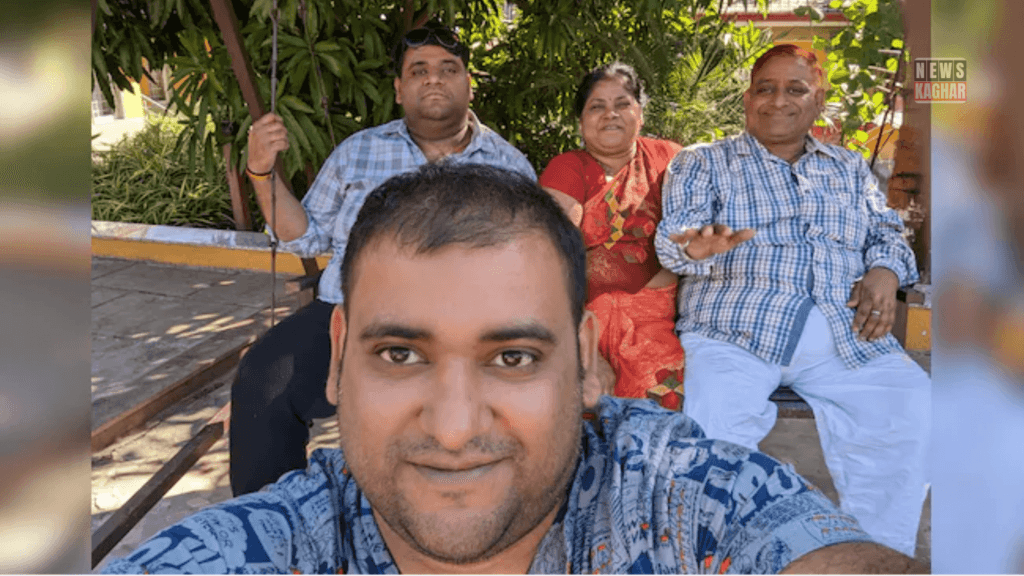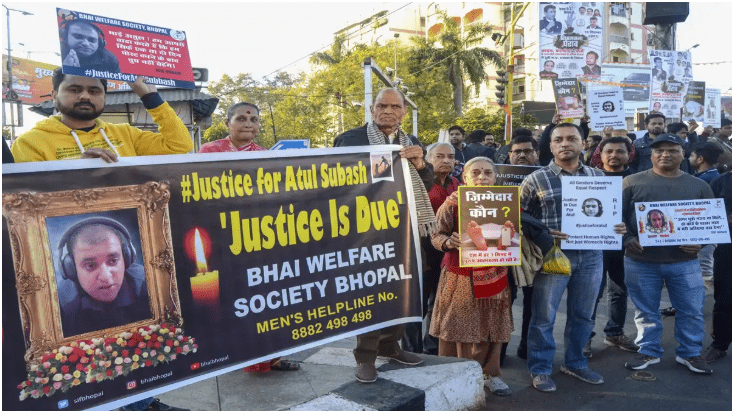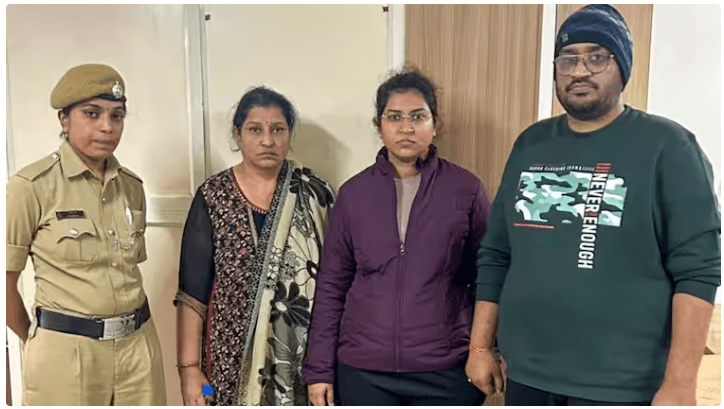
The unfortunate death of Atul Subhash has triggered a nationwide debate. Across cities and villages, one critical question is echoing — do men have equal protection and fairness under our current legal system? Many are now questioning why, in cases of dispute between a man and a woman, the man is often judged or blamed without a thorough investigation.
In India, several laws exist to protect women, and their importance cannot be denied. Women have historically faced significant challenges, and their safety must always remain a priority. However, this case opened a different conversation — one that highlights the need for fair and unbiased treatment for men as well.
For the first time, we’re witnessing large numbers of men raising their voices not for dominance or privilege, but for fair representation, equal legal rights, and justice. The case of Atul Subhash has brought to light the silence many men have lived with, fearing that their side of the story may never be heard.
Some argue that since Nikita, Atul’s wife, is a woman, it would be unfair to hold her solely accountable. However, this issue extends far beyond a single person. Justice must not be based on gender — it must be based on truth. We must also not forget that Atul’s mother, Anju Devi, is a woman too — a grieving mother seeking justice for her son. While protecting one woman, we must ensure another is not left unheard. Nisha Sharma case.
People also recall past cases like those of Manish Dalal and Nisha Sharma, where initial judgments were later questioned, yet public memory faded quickly. There is a growing concern that Atu’s story may meet a similar end — forgotten before real answers come out.
This case is not about blaming one side or favoring the other. It’s about recognizing pain, demanding fairness, and calling for reforms that ensure justice doesn’t come with gender bias.
Atul Subhash Case Details
The story of Atul Subhash is one that pierces the heart. If you still carry even a shred of humanity, his final moments will deeply disturb you. It’s a tale not just of personal pain, but of a larger societal issue — one that shakes the foundation of trust within marriage, and forces us to question how far we’ve come as a society in understanding men’s mental health and emotional struggles.
This is not just a tragic love story — it’s a painful cry against injustice. A story that raises serious questions about our legal and judicial system. A story that urges men to speak up — because staying silent might mean becoming the next Atul Subhash.
Atul and Nikita first met through a matrimonial platform and decided to get married after some initial conversations. Soon after their wedding, they traveled to Mauritius for their honeymoon. It was there that Atul’s life tool a devastating turn. During the trip, Nikita confessed to him that she never truly wanted to marry — not Atul, not anyone. She admitted that she had gone through with the wedding only due to pressure from her family, particularly because her father’s health was fragile.
Atul, a 34-year-old man full of hope for a new chapter in life, had tied the knot in 2019. But on December 9, he bid farewell to this world, leaving behind a 90-minute video and a 24-page note that narrated the pain he had endured.

Before ending his life, Atul Subhash left behind an 80-minute video and a detailed 24-page not — a heart-wrenching account of his final thoughts and the mental trauma he had been battling. These weren’t just random words; they were signs of a person deeply broken, emotionally drained, and utterly defeated by the constant turmoil he faced in his marriage and in seeking justice.
Reading his note or listening to his final recording, one can only imagine the intense psychological suffering he endured. His words reflect not just personal pain, but a sense of hopelessness with the very system that was supposed to protect him. The emotional weight he carried — from his relationship to his experience within the legal framework — pushed him into a darkness where life seemed unbearable.
This is not a story about a man or a woman. This is a story about a human being, whose cries for help were ignored. It’s important we see this through the lens of humanity — not gender. Atul’s final words expose a disturbing reality that demands attention, empathy, and change.
In a part of his note, Atul shared a chilling exchange. He recalled being questioned by his wife and mother-in-law: “Why haven’t you done it yet, like you said you would?” When he replied, ”If I had done it, how would your celebration continue?” What followed was even more disturbing they bluntly claimed it would never end and went on to say that in the event of your death, all your assets would automatically belong to them as your spouse. If your parents die, I will inherit theirs as well — being their daughter-in-law. Until then, you’ll keep visiting courtrooms.”
His final video — a detailed account of his last months — reveals not only his inner agony but also the deep cracks in our justice system. And maybe that’s what makes the whole situation truly frightening.
Atul Subhash’s Final Message: A Glimpse Into His Pain
In his final days, Atul Subhash recorded a video and left behind a handwritten letter that stretches across 40 pages — a document that paints a distressing picture of his emotional and legal struggles. Atul, an AI technician, had married with the hope of building a peaceful and fulfilling life. Soon after, the situation shifted in a heartbreaking and irreversible way.
Following his marriage, he found himself caught in a web of legal complications and court hearings, reportedly triggered by allegations made by his wife. What was supposed to be a life of companionship slowly turned into a nightmare of constant mental pressure and emotional breakdown.
In the last video he ever recorded — lasting nearly 90 minutes — Atul clearly named those he believed were responsible for his suffering: his wife Nikita, mother-in-law Nisha, brother-in-law Anurag, father-in-law Sushil, and a judge named Rita Kaushik.
Throughout the recording, Atul spoke in a clam but exhausted voice, revealing just how much pain he had silently carried. He repeatedly emphasized that no one can truly understand his trauma without watching the full video themselves.
One of the most heartbreaking statements he made was this: ”After my death, no member of my wife’s family should attend my funeral. And if I do not receive justice, then my ashes should be thrown in the drain outsides the court.”
These words were not just the cries of a broken man — they were a powerful and painful message to society, highlighting how how emotional trauma and legal battles can destroy a person from within.
A troubling trend seems to be taking shape in our society — one where marriage is sometimes treated less like a lifelong commitment and more like a short-term arrangement. Get married, stay together for a brief period, and then walk away with a hefty financial demand — often leaving the other person emotionally shattered and financially drained. Sadly, this pattern is becoming more common, and for some, it appears to have turned into a misuse of legal rights.
Today, the public is outraged. Social media is flooded with reactions, debates, and discussions around the Atul Subhash case. People are demanding answers. But a pressing question remains — will this lead to real change, or will it be just another moment of noise that fades away in a couple of days, forgotten like so man others?
Shocking Revelation by Nikita Singhania Leaves Everyone Stunned
The video left behind by Atul Subhash sent shockwaves across the nation. While he is no longer with us, the questions he raised continue to echo — questions about accountability, justice, and the emotional cost of silence. In his final message, Atul named several individuals whom he believed were responsible for his suffering. Many of those named are currently under police custody as the investigation unfolds.
However, in a surprising twist, Nikita Singhania — Atul’s wife — has made statements during interrogation that have taken the case in an unexpected direction. Her revelations have added new layers to the already complex case, leaving even the police puzzled.

In the following section of this article, we’ll share what Nikita has reportedly said about Atul after his passing — statements that have raised fresh doubts and are now being closely examined by the authorities.
On December 9, 2024, software engineer Atul Subhash ended his life, leaving behind a powerful video message that shocked the entire country. In that recording, he spoke openly about the reasons behind his extreme step, naming his wife Nikita Singhania, mother-in-law Nisha Singhania, and Jaunpur Family Court judge Rita Kaushik as individuals responsible for his emotional suffering.
Following his death, the police arrested four individuals mentioned in his note. However, the case took a sharp turn during the police investigation when Nikita, now in custody, made serious counter-allegations against Atul.
According to her statement during interrogation, Nikita claimed that she and her family were being wrongfully framed. She denied demanding any money from Atul and instead accused him and his family of asking for ₹10 lakh as dowry. She further alleged that Atul was involved in inappropriate behavior and claimed he had relationship with three different women in Bangalore.
Nikita told police that Atul used to spend most of his earnings on these women and also took away her salary. She added that even the money she received from her mother was taken from her by Atul. These new allegations have added a complicated layer to an already emotional and controversial case. As both sides present their narratives, investigators now face the challenge of uncovering the full truth behind this tragic story.
During questioning, Nikita shared more details, claiming that Atul and his family had demanded ₹10 lakh as dowry from her father — despite her family already spending nearly ₹10 lakh as dowry from her father — despite her family already spending nearly ₹50 lakh on the wedding. She alleged that when her father refused to fulfill the demand, threats of divorce began from her in-laws. According to Nikita, the stress and emotional burden of the situation deeply affected her father, eventually leading to his untimely death.
At this point, the case has become increasingly complex, with both sides making serious allegations. What direction it will take next remains uncertain — only time will reveal the full truth. How do you personally view this deeply tragic situation? Share your opinion in the comments below.
Where Is Atul Subhash’s Son Vyum Now?
Following the tragic death of Bengaluru-based software engineer Atul Subhash, people from all corners of the country have expressed their sorrow. As the case continues to unfold, new details are emerging almost daily — one of which concerns the whereabouts of Atul’s 4-year-old son, Vyum.
According to recent findings, young Vyum is currently enrolled in a boarding school. Interestingly, no one aside from Nikita’s family was aware of his location. Investigators have revealed that Nikita, sensing potential trouble ahead, had made arrangements in advance to send her son away from home.
At present, relatives from Nikita’s side are reportedly taking care of the child’s needs. It was Nikita herself who disclosed her son’s location to the authorities during police questioning.
Conclusion
The story of Atul Subhash is more than just a case — it’s a reflection of the emotional of the emotional battles many face behind closed doors. As facts and claims continue to emerge from both sides, one thing remains clear: this tragedy has sparked a deeper conversation around justice, relationship, and the human cost of silence.
For more updates and in-depth coverage on stories that matter, stay connected with us at newskaghar24.com.

❤🙌
Justice for Atul Subhash 🙏🙏
we want justice for RG Kar and Atul Subhash
Justice for Atul subash